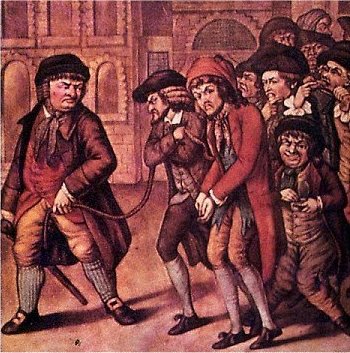Identity and social justice

Convicts in London, about to be sent to Australia
Have been thinking about how ancient Israel's identity as liberated slaves shaped their approach to social justice. A creed they recited before offering the first part of their harvest to God says,
My father was a wandering Aramean, and he went down into Egypt with a few people and lived there and became a great nation, powerful and numerous. But the Egyptians mistreated us and made us suffer, putting us to hard labor. Then we cried out to the LORD, the God of our fathers, and the LORD heard our voice and saw our misery, toil and oppression. So the LORD brought us out of Egypt with a mighty hand and an outstretched arm, with great terror and with miraculous signs and wonders. He brought us to this place and gave us this land, a land flowing with milk and honey; and now I bring the firstfruits of the soil that you, O LORD, have given me.I seems that this had alot of influence on how the the poor and the enslaved were supposed to be treated in ancient Israel. (I wrote a bit about this in January, here and here.)
(Deuteronomy 26:5-10)
Thinking about where our country has come from. Some of us have been living in this land longer than anyone can remember. Some of us are descended from poor people who were set out here as punsihment for petty crimes. One of the best known characters in our history was a bush-ranger. Some of our ancestors were persecuted in the goldfields because of their race. We had more casualties in the First World War than any other country, because our soldiers were put on the front line, even though it wasn't our war. Some of us ended up here because our homelands have been torn appart by war and genocide.
That's definitely not the whole picture of where our country's come from, but I'm wondering about how all this should influence the way we approach social justice.

3 comments:
That's interesting to think about. Considering people came out here and in a sense had to make their own way particularly through tough times like the depression. If Australians have made their way through tough times by hard work, we could look at others in tough situations and think they should 'just work harder and get themselves out of it' ...any merit in that?
While people who have made it through the tough times have had to take responsibility for themselves and their families by working hard, most have also been helped by stuff like the assisted passages programs and the work of people Caroline Chisholm.
In other words, I don't think it's accurate to say that our people have made it through ahrd times simply because every person has looked after themself, but also because people have looked after each other.
Yeah, Australia clearly has a contradictory and at times hypocritical history.
In a sense I reckon you're both right: we've got a history of 'looking after our own'. We're very keen to bring over and support nice, strong, white Anglo-Saxon and Celtic stock and have been known to take refugees, but once they get over here the support is withdrawn. Or, as is the case for way too many since the early 1990s, they're incarcerated.
Ethnic groups centre around particular suburbs and can live for their whole lives in microcosms of their own countries. For example, last year in Australian Modern History, we looked at Eastern European immigrants to Sydney after WWII. Poorly treated at their jobs of manual labour, some didn't learn English at all and relished that fact - they wore it as a badge of identity. Because they received insufficient support when they came over (pretty much nothing save token language lessons), they were forced to withdraw into their communities to get the assistance they needed to set up a home.
Our medical shortage is 'solved' by taking doctors away from developing countries where they're sorely needed. We still use foreigners as a cheap manual labour sources. We still marginalise Aborigines and blame them for their symptoms of marginalisation.
Hopefully I've made a point somewhere in that ramble. As for how it should influence our approach to social justice... that's going to take a lot more thinking.
Good post Christop, we've got to think a lot more about these things.
Post a Comment